Workplaces worst hit by coronavirus revealed, COVID-19 cases climb in Victoria’s largest regional towns
The workplaces worst hit by coronavirus outbreaks have been revealed, with warehouses and abattoirs among the industries that have suffered the most. It comes as Victoria records its deadliest day yet.
VIC News
Don't miss out on the headlines from VIC News. Followed categories will be added to My News.
This coronavirus article is unlocked and free to read in the interest of community health and safety. Get full digital access to trusted news from the Herald Sun and Leader for just $1 for the first 28 days.
Victoria has recorded 410 new cases of COVID-19 and 21 deaths, the highly daily death toll recorded during the pandemic.
Of the new deaths, 16 are linked to aged care outbreaks.
WORST-HIT WORKPLACES REVEALED
Warehouses and abattoirs are among the worst workplaces for coronavirus outbreaks, with new figures detailing what industries have suffered the most during the second wave.
Data released by the state government shows warehouses have become a problem area for authorities after 43 sites accounted for 439 infections.
Abattoirs were linked to 14 outbreaks and 551 confirmed cases.
Other key industries have contributed to a number of other notable clusters that were smaller in size.
Food distribution businesses have contributed to 172 infections across 9 sites, 80 cases have come from 14 retail stores and there have 84 infections across 11 supermarkets.
The figures have also shown the spread of coronavirus among some of the key locations that have most challenged public health authorities.
There have been 2453 infections among 136 aged care homes and 630 cases across 69 schools.
Hospitals and health care services were linked to 540 infections and child care centres were traced to 180 cases.
BY THE NUMBERS
Two women and one man in their 70s, six women and five men in their 80s, five men and one woman in their 90s, and one woman in her 100s are among the deaths.
A total of 267 Victorians have now died from coronavirus.
There are 53 new “mystery cases”, and 1079 active cases in healthcare workers.
There are 1929 active cases linked to aged care outbreaks, while there is a total of 7877 active cases across the state.
2961 of the active cases indicate community transmission.
There are 662 Victorians in hospital with the virus, of which 43 are in intensive care and 25 on ventilators.
A total of 1,876,615 tests have been carried out since the start of the pandemic.
Premier Daniel Andrews said restrictions would be in place until next year if Victorians didn’t adhere to them and case numbers didn’t decrease.
“It won’t be a 6-week strategy, it will be much, much longer,” he said.
“We will be into 2021 with significant lockdown in place. That’s not acceptable.”
476 AGED CARE RESIDENTS TRANSFERRED TO HOSPITAL
More than 400 residents in aged cares have been transferred to hospital since outbreaks again and the majority of these tested positive to coronavirus.
There are 1923 active cases linked to 122 outbreaks in private facilities and six cases in state-run care homes.
Mr Andrews said early signs indicated many infected healthcare staff were acquiring the virus outside of their workplaces.
“I’m not making any judgment on that that is just what the data is telling us,” he said.
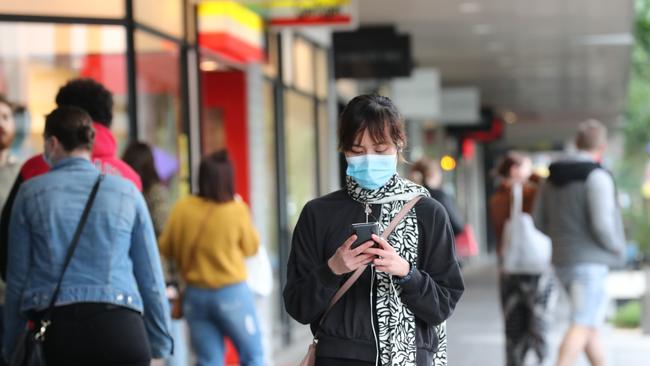
REGIONAL CASES INCREASE
Premier Daniel Andrews warned there were some concerning increases in regional Victoria, including Ballarat and Geelong.
“We have seen some increases of concern to us in Geelong, Ballarat and Bendigo,” he said.
“They are stable, they’re very low numbers, but coming off such a low base, any additional cases are of concern to us.”
Mr Andrews urged Victorians to think twice about their need to travel.
“I made some comments yesterday about people really just stopping and thinking about whether travel to regional Victoria or travel from regional Victoria to metropolitan Melbourne is absolutely necessary,” he said.
“I just ask people to give that little bit of extra thought to that and if there’s any sense that that trip could be avoided, that that travel could be limited, well then that is conducive with less movement, less cases and getting to the other side of this.”
There have been 957 cumulative cases in regional Victoria, with 14,351 in metropolitan Melbourne.
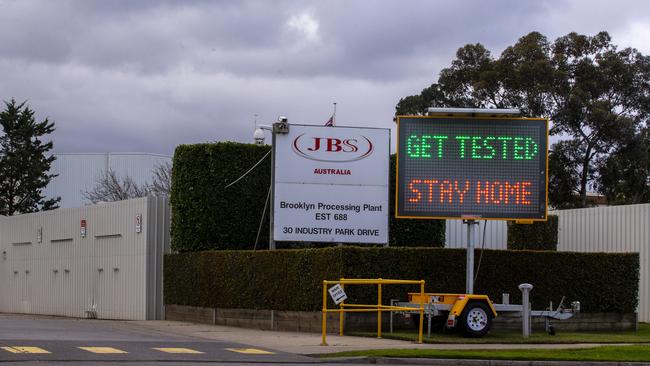
CURRENT OUTBREAKS
• 202 cases have been linked to Bertocchi Smallgoods in Thomastown;
• 123 cases have been linked to Melbourne Health Royal Park Campus;
• 60 cases have been linked to the Woolworths Distribution Centre in Mulgrave;
• 59 cases have been linked to the Linfox warehouse in Truganina;
• 29 cases have been linked to Diamond Valley Pork in Laverton North;
• 21 cases have been linked to Hazeldene’s Chicken Farm in Bendigo;
• 18 cases have been linked to Caroline Chisholm Catholic College in Braybrook’
• An outbreak at Corio Village Shopping Centre is currently under investigation;
• An outbreak at Peninsula Private is under investigation.
ACTIVE AGED CARE OUTBREAKS (CUMULATIVE)
• 198 cases have been linked to Epping Gardens Aged Care in Epping;
• 182 cases have been linked to St Basil’s Homes for the Aged in Fawkner;
• 153 cases have been linked to Estia Aged Care Facility in Ardeer;
• 129 cases have been linked to Kirkbrae Presbyterian Homes in Kilsyth;
• 115 cases have been linked to BaptCare Wyndham Lodge Community in Werribee;
• 107 cases have been linked to Outlook Gardens Aged Care Facility in Dandenong North;
• 97 cases have been linked to Estia Aged Care Facility in Heidelberg;
• 89 cases have been linked to Arcare Aged Care Facility in Craigieburn;
• 82 cases have been linked to Glendale Aged Care Facility in Werribee;
• 79 cases have been linked to Aurrum Aged Care in Plenty.
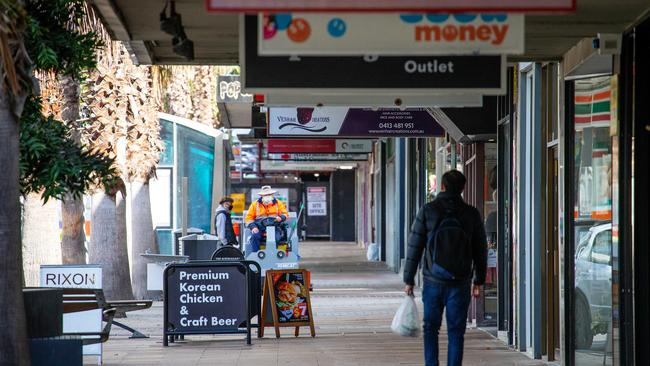
FOUR COLES STORES CLOSE AFTER WORKERS CONTRACT VIRUS
The dreaded coronavirus has hit four major Melbourne supermarkets in the past 24 hours.
Four Coles staff members returned positive tests for COVID-19 on Tuesday, with the employees working shifts at Coburg on Sydney Rd, Altona, Cardinia Lakes and Elsternwick.
At the Coburg store, the worker was last in the supermarket on August 9. A “small number” of team members have been deemed close contacts and asked to self-isolate.
The infected Altona employee last worked on August 6, with close contacts asked to self-isolate, while Cardinia Lakes and Elsternwick staff members who tested positive last worked on August 5 and August 2 respectively.
Read the full story here.
– Anthony Piovesan
184 VICTORIANS FINED IN PAST 24 HOURS
A Melbourne man who drove 153km to “pick up a friend” in regional Victoria is among 184 people fined for breaching COVID-19 restrictions.
Victoria Police issued fines to 184 people in the past 24 hours.
They include 24 fines for people not wearing masks, 58 for curfew breaches and 16 for breaches at vehicle checkpoints.
Among those fined was a man who drove from Mooroolbark to Mansfield to pick up a mate and a Pakenham man who drove to Dandenong to hang out with mates and wander the streets.
Police also fined four men who told police they were “just chilling” when found in a parked car in Flemington after curfew.
– Aneeka Simonis
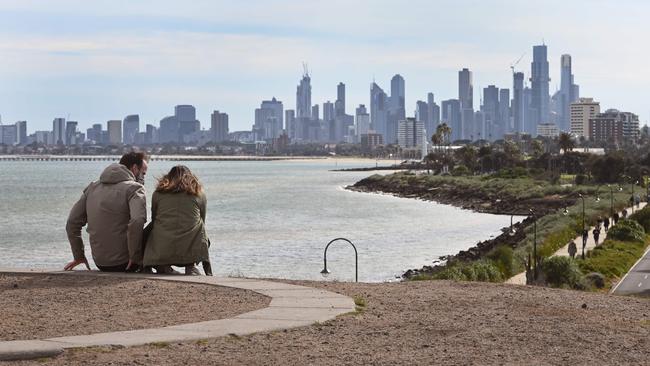
ANDREW CRISP ‘DID NOT SEEK’ ADF HELP WITH HOTEL QUARANTINE
Victoria’s emergency management commissioner says he did not seek ADF support on the state’s bungled hotel quarantine program during planning meetings.
Andrew Crisp issued a statement after a war of words broke out between Premier Daniel Andrews and federal Defence Minister Linda Reynolds over whether defence force personnel help was offered.
On the day Prime Minister Scott Morrison announced the mandatory hotel quarantine program, he said that ADF personnel would be offered to “assist in compliance with these arrangements”.
But Mr Andrews claimed on Tuesday it was “fundamentally incorrect” that his government “said no” to hundreds of ADF members coming to help.
“I don’t believe ADF support was on offer,” he said.
Read the full story here.
WORKPLACE STATISTICS BREAKDOWN TO BE ANNOUNCED ‘SOON’
Mr Andrews said a breakdown of cases in workplaces would be revealed in the coming days.
“I hope to be able to provide you quite soon with the detailed breakdown across the following types of settings – aged and residential care, schools, hospital and healthcare, student accommodation, backpackers, social settings, for instance, child care, disability settings, food premises, correctional facilities, laboratories, other primary family home domestic settings,” he said.
“And from a workplace point of view, warehouse, food distribution, retail, office, abattoir, supermarket, logistics, so on and so on.”
UNEMPLOYMENT FORECAST WORSENS
Victoria’s dole queue is tipped to lengthen as official forecasts worsen since the introduction of stage four restrictions.
Modelling predicts unemployment could peak at 11 per cent in the three months to September, a 2 per cent rise on forecasts released last month.
The Department of Treasury and Finance expects job losses to peak at 325,000.
Australian Bureau of Statistics data released on Tuesday showed payroll jobs fell by 1.5 per cent in Victoria through July ahead of the introduction of fresh restrictions.

About 40 per cent of jobs lost across the state by mid-April had been regained by June 25, but by the end of July this had reduced to 24 per cent.
The accommodation and food services and arts and recreation services industries were hit hardest.
Treasurer Tim Pallas said Victoria, like economies worldwide, was suffering devastating economic impacts caused by the pandemic. “Our economy is resilient and we will get through this, but the best thing right now is get on top of the health emergency so we can begin the task of economic recovery,” he said.
The latest modelling forecasts real gross state product to be 11 per cent lower than expected in the June Quarter, and a further 9 per cent lower in the September quarter.
Independent modelling by Deloitte found billions of dollars in economic support by the Victorian government had cushioned the economic blow.
The Deloitte modelling showed the initiatives saved or created more than 81,000 jobs in the June quarter.
Mr Pallas said payroll tax exemptions for Victorian businesses involved in the JobKeeper program would be extended until March.
The extension will also include an exemption on WorkCover premiums for eligible workers retained as part of JobKeeper.
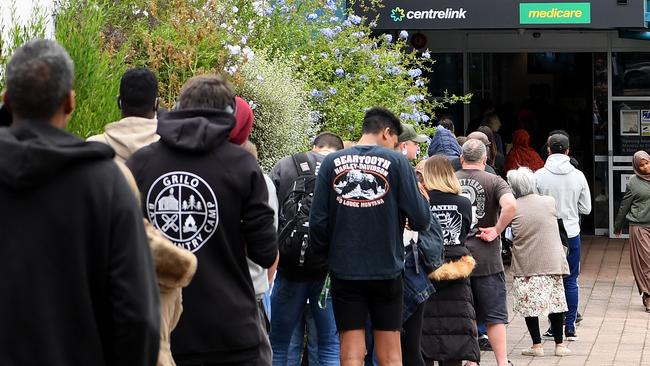
LEADER SATISFACTION ON THE DECLINE
Aussies are feeling dissatisfied with their leaders and fear they’ve got another two years of COVID-19 challenges ahead, social researchers have found.
Victorians are bearing the brunt of the pandemic, with 76 per cent feeling drained by ongoing restrictions compared to only half in other states, McCrindle research shows.
Victorians are also more suspicious of the way governments are handling the pandemic, with 81 per cent in this state questioning the government compared to two-thirds in other states.
“Covid-fatigue is impacting the sentiment and compliance of Australians currently. The second-wave has sapped the optimism that residents of this Lucky Country usually express. There is a sense that there will not be a snap-back to how things were, and for now at least, personal anxiety is high and national resilience is low,” demographer Mark McCrindle said.
Although two-thirds of people are worried about how governments are handling things, 93 per cent are following health advice and 89 per cent are willing to reduce their personal freedom for the sake of others.
However, 70 per cent of people are in no hurry to return to their pre-Covid working lives.
Nearly 80 per cent of the 1000 people surveyed say Covid-19 has made their family and household relationships stronger, although half say they have experienced tension with those they are closest to.
Growing loneliness is a particular problem among young people, with a report from Socialsuite, a social impact technology company, finding 41 per cent of those aged 18 to 24 feel lonely compared to 29 per cent of adults on average.
- Susie O’Brien
FITNESS BLOGGER CAUGHT BREAKING LOCKDOWN LAWS ON INSTAGRAM
A Melbourne fitness blogger has come under fire after breaking lockdown exercise restrictions and posting the evidence on social media.
Dozens of furious Instagram users slammed Prahran health and wellness ‘influencer’ Beck Lomas after she shamelessly posted pictures after she completed a two and a half-hour walk on Monday and went for two runs in a day on Tuesday.
Ms Lomas posted the promotional content to her 166,000 strong following a bid to beat her boyfriend Josh Klein as part of the FitBit and ANZ’s sponsored #FitBitWithFriend couple’s challenge, which encourages participants to log the “most active minutes” as possible within six days.
The 25-year-old lingerie brand founder also paraded pictures in her activewear in the street without a mask on Tuesday before snapping a selfie with Mr Klein who was also without a face covering.
Read the full story here.
– Brittany Goldsmith
QUARANTINE HOTEL MANAGER AXED IN GROG SCANDAL
A manager at the health department has been stood down over claims he offered to sell quarantined hotel guests alcohol for profit.
The Australian reported a complaint had been made after the official commented about getting booze for those quarantining at the Brady Hotel and the Grand Chancellor.
“(The official) suggested that he could go and purchase alcohol for guests ‘at profit’ and that he would be charging people for delivery. This did not appear to be an ethical or practical way to manage this,” a written complaint states.
The report suggests the comment was made during a debate about if alcohol should be given to guests who could be battling addiction or mental health problems while isolating because they are either infected or a close contact.
The senior Department of Health and Human Services official has been stood down and an investigation ordered.
Read the full story here.
YOUNG SWEPT UP IN NEW VIRUS WAVE
Alarming new statistics have revealed the toll of the second wave on our youngest Victorians, with more than 800 children under nine diagnosed with coronavirus since the pandemic began.
It comes as the state equalled its highest number of lives lost in a single day, with 19 deaths and 331 new cases.
Fourteen of the deaths were linked to aged-care outbreaks. The state’s death toll now stands at 246.
New figures showed there were 366 active COVID-19 infections among children under nine and 736 more between ages 10 and 19.
The data also revealed a worrying trend for Victorians older than 90 who are among the most vulnerable to the virus.
Of the 492 cases diagnosed in this age range, only 14 have recovered and 406 are still active.
Michael Gantier, a researcher in immunity at the Hudson Institute of Medical Research in Melbourne, warned the state’s number of daily deaths could worsen before getting better.
He said it was fair to assume cases would rise “to about 40 deaths a day, for a few days,” given the high number of cases in recent weeks.
“I was checking the dates where we saw 700 cases last week — and it’s fair to say probably in the next seven days we’ll likely see more deaths (because of this),” Dr Gantier said. “I’m very hopeful that the numbers are already going down and I think we just have to be resilient.”
Health Minister Jenny Mikakos on Tuesday said between 10 and 15 per cent of health workers who had contracted coronavirus had done so at work, with 1097 active cases in this category.
Mystery cases continued to grow, with 100 new cases taking the total to 2903.
Premier Daniel Andrews said community transmission was smaller than it had been in recent days.

He said transport showed movement around Melbourne had fallen dramatically since curfews were introduced.
“That data bears out that the strategy is working,” he said.
“We’ve got to keep seeing these numbers come down. We’ve got to keep seeing transmission at a much lower level.
“All of our experts remain convinced and very confident that as we’re just into the early parts of the second week, not even yet a full week, of many of stage four’s most significant changes, we will continue to see data that forms a trend and we’ll continue to see numbers coming down.
“Exactly how long that takes and to what the lowest number is we can get to, only time will tell.”
Mr Andrews urged Victorians to be patient as they worked through restrictions.
“It is a six-week strategy,” he said. “No one wants to be in these settings but the public health experts have told us, they’ve made it very clear, this is the only way we’ll get the numbers down.”
— Kieran Rooney
CHILDCARE TEACHERS NOT VALUED
Almost nine out of 10 early childhood teachers felt the sector was vulnerable because of COVID-19, according to a report.
The Front Project survey of 1500 workers also found eight in 10 felt undervalued and unrecognised.
The research was undertaken in May and June — before the Victorian stage four lockdown was considered.
The teachers also felt the ability of the sector to care for vulnerable children was going backwards, and that families with disadvantaged children were more at risk than before.
Despite the issues, 80 per cent of workers felt the challenges of coronavirus had enhanced their work and helped them learn, and two-thirds felt their jobs were secure.
“Many teachers and educators are gaining new skills, deepening knowledge of practice and strengthening relationships with children and families,” the report read.
Education Minister Dan Tehan announced a further 30 absence days for Victorian families to enable them to keep children enrolled while avoiding fees and losing their spots.
Providers have been asked to waive gap fees for those days, but officials from the Department of Education on Tuesday told the federal COVID-19 committee they were not able to make it mandatory.
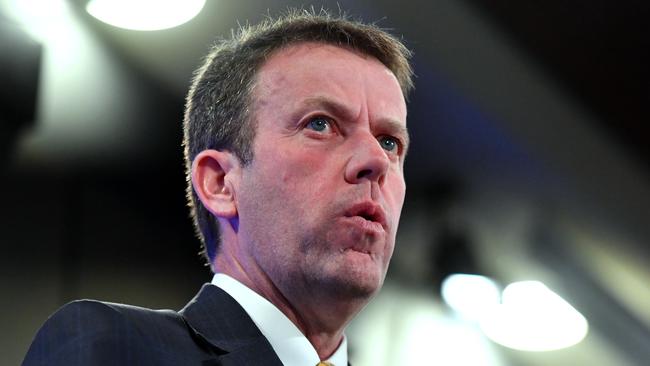
MOST VULNERABLE THE HARDEST-HIT
Young Australians are bearing the brunt of economic pain caused by the coronavirus lockdown, a new study has found.
The Roy Morgan research, commissioned by not-for-profit Good Shepherd, found half of working Australians aged 14-24 had become economically vulnerable during the pandemic.
The study was based on data from 6000 working Australians since April.
It found those hit hardest financially were the young, migrants and women.
Migrants who have been in Australia less than five years were more likely than Australian-born people to have become economically vulnerable, the research found.
Small-business operators and those working in recreation, entertainment and hospitality were the most likely to have become economically vulnerable.
Good Shepherd chief executive Stella Avramopoulos said the research offered hard evidence that the most vulnerable were bearing the greatest economic impact of the pandemic. “These are shocking figures,’’ she said.
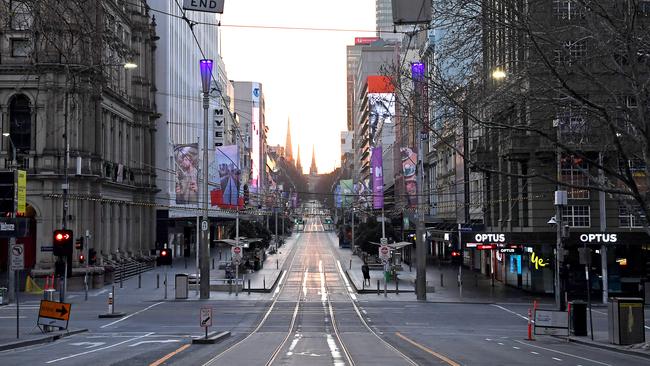
$26 MILLION TO EASE MENTAL BURDENS
Businesses forced to shut during the lockdown will have greater access to mental health services under a multimillion-dollar state government scheme.
The $26m program was aimed at helping owners and employees of small to medium enterprises.
As tightened restrictions have financially crippled many Victorian businesses, the government has brought in extra measures to address heightened levels of stress and anxiety.
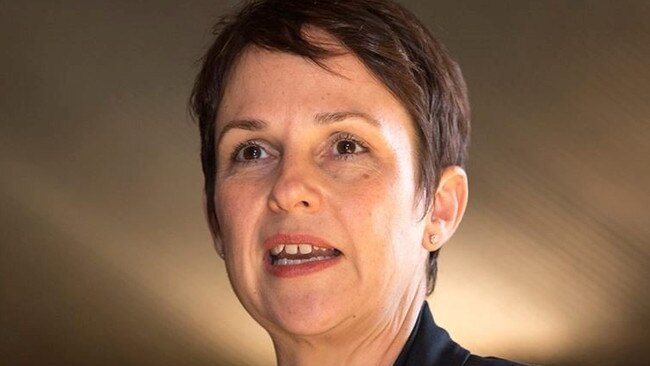
MORE NEWS
MINISTER SLAPS DOWN ANDREWS’ CLAIM
MELBOURNE TRAVELLER TESTS POSITIVE IN TASSIE
WHY VICTORIA SHOULD BRACE FOR 40 DEATHS A DAY
As part of the program, St John Ambulance will provide accredited mental health support training to chambers of commerce statewide to boost mental health capabilities in local business communities.
Trained workers will be instructed on how to identify and respond to people in distress.
Small Business Minister Jaala Pulford said it was an extremely difficult time for business owners and their workers.
“It’s important that we provide practical, accessible support across the board,” she said. “As a community we can weather the coronavirus storm in the best shape possible on all fronts.”
Contact the wellbeing mental health support hotline on 1300 375 330.
Originally published as Workplaces worst hit by coronavirus revealed, COVID-19 cases climb in Victoria’s largest regional towns
